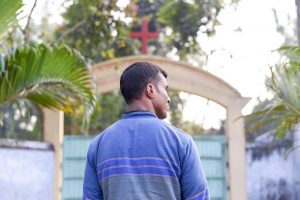The Beatitudes: Global Perspectives on the Way of Jesus
God, Devotional , TheologyContributed by: Compassion Canada
What does it look like to live the way Jesus did in our culture today? And what might it look like for us to live out the radical, challenging words of Jesus in our daily lives like He actually meant what He said?
Written by Compassion Canada writers Alyssa Esparaz and Laura Phillips, this 8-day devotional dives deep into the Beatitudes (Matthew 5), challenging you to experience Jesus’ countercultural call to resist selfishness and fear and live in love. Rooted in themes from scripture and stories from Compassion children living out the way of Jesus around the world, this study walks you through reflections and prayers designed to help you live more like Jesus.
Day 1:
Readings: Matthew 5:3 James 4:6 Isaiah 66:2

“Blessed are the poor in spirit, for theirs is the kingdom of heaven.”
Do you ever judge a book by the opening sentence? The first line is intentionally chosen by the author to hook you into the adventure you’re about to embark on. It can pique your interest, keep you wanting more, or maybe even make you send it straight back to the library.
Knowing this, we can assume that the choice to use a line like, “Blessed are the poor in spirit” to start off an epic sermon was a very intentional one by Jesus. For His disciples and those listening that day, those words would’ve sounded very familiar, echoing the words in Isaiah, “These are the ones I look on with favor: those who are humble and contrite in spirit, and who tremble at my word” (Isaiah 66:2).
To be poor in spirit is a heart posture of humility. It’s a radical decision to recognize our lack without God and to humble ourselves enough to know that we can’t survive on an attitude of self-sufficiency. When we posture our hearts in this way, we recognize we are finite, and He is infinite.
When she was just 11 years old, Josiele from Brazil was diagnosed with scoliosis. Her doctors recommended she wear a back brace until she was 18. Though she felt overwhelmed by the challenges ahead, Josiele chose to live out of a posture of humility.
“Although I need to wear this vest, I feel grateful to God because I know that many people can’t even walk,” says Josiele. “I know that maybe if I didn’t have the limitations I have, I’d be a completely different person. I know that God is the One who guides my ways and that He can make all things possible.”
Today, ask God to posture your heart towards humility. Reflect on young Josiele’s posture towards her limitations and what you can learn from her reliance on Christ.
Prayer:
Father, help me to recognize that I am finite. I know that I often think I am capable of handling life on my own, but the truth is, I am lost without you. May that simple truth penetrate my heart today so that I might ever be aware of your sovereignty in my life. Amen.
Day 2:
Readings: Matthew 5:4 Psalms 34:18 Isaiah 41:10

“Blessed are those who mourn, for they will be comforted.”
Do the words of Jesus ever surprise you? The second line of His sermon is just as radical and counterintuitive as the first: blessed are those who mourn. Anyone who’s experienced mourning can tell you that on the surface, grief rarely feels like a blessing. But as we dig deeper, maybe Jesus was on to something: for they will be comforted.
Perhaps when we mourn, we experience the presence of God in new ways—ways we never would’ve wanted or imagined but need in our moments of grief. Psalm 34:18 reminds us that the Lord is close to the brokenhearted. In fact, throughout scripture, we see that more often than not, God’s response to our troubles is not a solution, but His presence. “I am with you,” seems to be God’s refrain, even to the point of sending His Son, Jesus, to be with us.
One beautiful way God is with us in our grief and times of trouble is through each other—through the Church.
Suzanna is a young woman in Tanzania who unexpectedly lost her father, Yona, when he suddenly fell ill. The grief she experienced was immense. “The day [my father] passed away was the saddest day of my life. We had a lot of plans,” says Suzanna. “Plans that I could not fulfill without him.”
Yona was saving to help Suzanna fulfill her dream of pursuing post-secondary education. After his death, Suzanna’s dream was gone—and then things got worse. Her mother began to lose her eyesight. Her younger brother was forced to drop out of school. Then, Suzanna became pregnant and the father of the baby left her.
“I was afraid,” Suzanna says. “Things were desperate. Some days we could not afford to buy milk for [my baby], which broke my heart.”
In the midst of her despair, a local church partner of Compassion came alongside Suzanna and her family. They provided food and medical care for Suzanna’s daughter, Dorcas, and capital to help Suzanna start her own small business.
In her grief, God met and comforted Suzanna through His people. How might you comfort someone who is mourning today? How do you need comfort? Sit with the truth that God is close to the brokenhearted and saves those who are crushed in spirit.
Prayer:
God, thank you for drawing close to us when we mourn. Thank you for being a God of comfort. Help me be aware of your presence with me when I am brokenhearted. Help me to be a comforting presence to those around me who are mourning, that I may remind people they are not alone. Amen.
Day 3:
Readings: Matthew 5:5 Psalms 37:11 Philippians 2:3-4
“Blessed are the meek, for they will inherit the earth.”
Meek isn’t a word you hear very often these days, is it? In fact, if you were to look it up in the dictionary, you likely would be a bit surprised by what you read. Overly submissive, compliant or quiet in nature are a few words you’d see used to describe it. So, is Jesus asking us to be pushovers?
Sadly, our modern English translation of the word ‘meek’ grossly misrepresents its original meaning in Jesus’ day. In its original Greek, the word used for ‘meek’ is ‘prautes’. This word implies a complete lack of self-pride and self-concern. It suggests putting oneself below others in an act of servanthood—looking out for the needs of others over one’s own. Knowing this, we can see that meekness actually requires a huge amount of strength, sacrifice, and maturity. It’s not weak and flimsy, but strong and self-sacrificing.
Sounds a lot like the way Jesus both lived and died, doesn’t it?
When the COVID-19 pandemic hit, the people of the remote desert village of Manuare, Colombia lost work and access to clean water. The clean water truck that once delivered to their village stopped coming by. Families were left without their basic needs.
So, staff and volunteers at a neighboring city’s church got to work. Since there were no roads to access the remote village, they piled food packs and water onto wooden wagons to bring to each child and their family, journeying through the desert by foot from wherever they lived. They walked back and forth for two days to make sure every family had what they needed.
Meekness requires strength enough to sacrifice your own comfort for the needs of others. How can you implement a spirit of meekness into your life? What are the things that prevent you from living a self-sacrificial life? In your time with Him this week, ask God to show you ways you can live out meekness in a world that tends to put the self first.
Prayer:
Jesus, in our world today, meekness tends to take the back seat. We live in a “me-centered” culture. But you call us to an “other-centered” way of life. I pray that you would give me eyes to see where in my life I can put others’ needs before my own. Give me the strength to choose meekness and self-sacrifice. Amen.
Day 4:
Readings: Matthew 5:6 Amos 5:24 Genesis 1:31

“Blessed are those who hunger and thirst for righteousness, for they will be filled.”
Content warning: Today’s reading includes mention of sexual assault.
Do you ever look around the world and think, it’s not supposed to be this way?
There’s so much injustice. So much pain and suffering. So much that’s not right in the world.
That feeling is a hunger and thirst for righteousness or translated another way, justice. It’s a constant reminder that we weren’t created for this—it’s not supposed to be this way. We long for the wholeness of the Garden of Eden, a time when God’s very good creation hadn’t yet been fractured by sin and deceit and injustice.
Sometimes, longing for justice in a world that is so fractured feels foolish. But the fourth Beatitude tells us it’s not silly to long for justice—it’s a blessing. Our longing for justice will be fulfilled. In the meantime, as followers of Jesus and citizens of his upside-down kingdom, we can pursue justice. We can seek to make things right and restore God’s very good Creation in partnership with Him.
In 2018, 13-year-old Mali was sexually assaulted by her teacher at her boarding school in Thailand. This egregious betrayal of her trust might have gone unaccounted for if it wasn’t for a brave friend who spoke up and the staff at her Compassion center who resolved to seek justice.
“It was very hard in the beginning when Mali was going through the investigation and court appointments,” says Suwachai, the director of Mali’s Compassion center. “That year was hard for her and for all of us, to believe in justice for poor people like us.”
Globally, the vast majority of sexual assaults are never reported, and even less result in the perpetrator being brought to justice. That was almost the case for Mali when the perpetrator attempted to bribe her family to keep their mouths shut, knowing they were poor and likely couldn’t afford to put up a fight.
But the community around her wouldn’t have it. Compassion covered all the costs for Mali’s family, and Compassion staff stood by her every step of the way. Thankfully, against all odds, the perpetrator was brought to justice—sentenced to 12 years in prison and a 200,000 baht fine (equivalent to approximately CA$8,500).
“I know now that I have a voice,” says Mali. “When wrong things happen, I know I have the right to speak.”
How can you seek justice in an unjust world? Today, know that you can lean into your longing for justice with the assurance of Jesus’ words: they will be filled.
Prayer:
God of justice, so much feels not right in our world. Yet we know you long for justice far more than we ever could. And we also know that in you, it is finished—we have the assurance of your kingdom come. May that spur us on as we fight for justice here and now, knowing that you stand with us when we stand up for what is right. Give us the courage to seek restoration in our fractured world. In Jesus’ name. Amen.
Day 5:
Readings: Matthew 5:7 Romans 5:8
“Blessed are the merciful, for they will receive mercy.”
Have you ever chosen to forgive someone who has hurt you over and over? Or someone who never asked for forgiveness at all? It’s probably one of the toughest things we’ll do in our relationships with one another.
Forgiveness can sometimes feel like pulling the prickles of a weed out of our hands. Even after we choose to remove the thorn, we’re left with a throbbing pain afterward. This is mercy in action—it chooses reconciliation over division, even if the healing doesn’t come right away.
One of the hardest things about mercy and forgiveness is that it is vulnerable. It’s a choice we make. It requires us to open ourselves up again. To tear our walls down. To walk on.
We see this perfectly exemplified in Christ. “While we were still sinners,” the scriptures say, “Christ died for us” (Romans 5:8). God chose to show us mercy we didn’t deserve while we were still in the darkness. We choose to forgive others because God forgave us first. It is a response to the great love we’ve already been given in Christ.
Christine was just four years old when she lost her parents in the Rwandan genocide. She vividly remembers running from the rebels with her mom. When they caught up with them, Christine’s mother urged her to run free. While running away, Christine witnessed her mother get shot.
As she grew more into herself, her faith, and her passions, through her time with Compassion and her life at home with her aunt and grandparents, Christine’s aspiration became to change the tide of society around her—to instill lasting hope. To forgive and move forward into a life of radical reconciliation powered by her consistent love for others.
After accepting Jesus in her teenage years, Christine decided—by God’s grace—to forgive the people who murdered her parents.
Mercy requires a large heap of strength, for both the big and the small hurts of life. Think about any fractured relationships you might have in your life today. Where can you choose to extend radical mercy? Ask God to guide you and give you the strength to choose forgiveness.
Prayer:
God of mercy, you are the ultimate example of what mercy looks like. While we were still sinners, you chose to die for us. What greater mercy is there than this? I pray that you would free my soul to choose this kind of radical mercy, even when it feels vulnerable and even if I don’t ever receive an apology. It is difficult, but there is a beautiful freedom in choosing mercy. Amen.
Day 6:
Readings: Matthew 5:8 Psalms 51:10 Matthew 27:27-50

“Blessed are the pure in heart, for they will see God.”
Doesn’t purity seem sort of radical today? Again, Jesus’ words in the sixth Beatitude radically shock us. “Pure in heart”? It almost makes you want to scream, Have you seen the world around us, Jesus?!
But the thing is, He has. He experienced the worst of the world’s evil and brokenness while He was here on earth. Each year on Good Friday, we remember the ultimate instance of this: when Jesus was arrested, mocked, whipped, spit on, tortured, and crucified.
Sometimes, in the midst of a world filled with so much brokenness, it seems impossible to keep your heart pure. Cynicism, apathy, despair, bitterness, and rage seem so much easier. Or perhaps, we’re tempted to “turtle”—to desperately try and hide from the world in order to keep ourselves separate from all that threatens the “purity” of our hearts.
But Jesus shows us a different way. In Jesus’ life, we see Him enter the brokenness of our world and face it head-on—to the point of death on a cross. We see in Jesus’ life that it is not the separation from the brokenness that keeps us pure and leads us to see God, but our pursuit of pure hearts in the midst of brokenness that allows God’s presence to be that much more impactful in our lives and the lives of those around us.
This truth is evident in the life of Guillermo from Bolivia. His life has been one of hardship—marked by deep brokenness that he struggled to reconcile with a good God as a child. Despite hearing about the love of God at his Compassion center, the addiction and neglect that plagued his home led him to reject God and embrace a life amongst his neighborhood’s dangerous gangs.
Guillermo’s life spiraled into one of crime, violence, and addiction. But when he eventually ended up in prison, something began to shift. He prayed to the God he’d heard about as a child, begging for help. God responded. Once he was released, a slow process of discovering God’s pure love began in Guillermo’s heart, fuelled by the commitment of Compassion center staff who never gave up on him.
Today, after a radical transformation, 22-year-old Guillermo will soon graduate from seminary with a theology degree. He is the co-pastor of his church and leads the youth group. “I was dead before. My life didn’t have a meaning, but when I received Christ in my heart, He brought life to me and gave me meaning,” he says. “I was resurrected along with Him. I don’t feel proud to say I was a drug addict, but I’m proud to say that Christ changed my life.”
Like Christ’s victory after the crucifixion, the purity of Guillermo’s heart is all the more radical in the face of the pain and brokenness he’s faced. How can you pursue a pure heart today, even in the midst of a broken world?
Prayer:
Dear God, the words ‘pure in heart’ feel so fragile in face of the brokenness in our world. And yet I know that you don’t call us into your presence in spite of the brokenness but because of it. So, I echo the words of David in Psalm 51: Create in me a pure heart, O God, and renew a steadfast spirit within me. Thank you that I don’t walk through this broken world alone, God, for you are with me. Amen.
Day 7:
Readings: Matthew 5:9 Jeremiah 29:7 James 3:18
“Blessed are the peacemakers, for they will be called children of God.”
When you think of peace, what comes to mind? Is it a feeling of complete content? Is it the total absence of conflict in all areas of your life? When Jesus speaks of peace in the New Testament, his picture was much bigger than a quiet house or simple absence of war. It’s actually much more beautiful and expansive.
When Jesus spoke of peacemakers in the Sermon of the Mount, he would have used the word “shalom” which, in Hebrew, refers to completeness or wholeness. Jesus’ heart is to send us, his disciples, out into the world as administers of peace, reconciliation, and restoration in all areas of life—in our relationships, our communities, and in creation as a whole.
Adam is a Compassion alumnus from the Philippines. He grew up in Mindanao, a cluster of islands known for its extreme violence. Because of its cultural and religious diversity, acts of terror and aggression amongst extremist groups occur regularly.
With a passion for peace, Adam wanted to change his home for the better. With Compassion’s help, he graduated high school and was enrolled in Xavier University for Development Communications. As part of a class assignment, Adam began a social media campaign called I Am Mindanao to educate his peers about violent extremism and empower them to seek new, peacemaking solutions.
Word of the campaign spread to the public and is now an active community with more than 42,500 online followers. It’s even gained attention as far as Washington D.C., where Adam was invited to share his campaign with international leaders and policymakers.
Peacemaking can be administered in both big and small ways in our lives. Can you think of practical ways you can pursue peace in your life? In your community? In the world around you?
Prayer:
Jesus, you are the Prince of Peace. You call us to actively pursue a holy shalom—to partner with you in the restoration of all creation. Show me ways, both big and small, that I can be an instrument of peace in this world and in my own life. Amen.
Day 8:
Readings: Matthew 5:10 Matthew 6:10 Matthew 28:5-6
“Blessed are those who are persecuted because of righteousness, for theirs is the kingdom of heaven.”
If Christ is risen and has defeated death, why doesn’t it always seem like it? In the final of his eight opening statements to the Sermon on the Mount, Jesus more or less sums up the tension of what it means to follow Him: Blessed are those who are persecuted because of righteousness, for theirs is the kingdom of heaven.
Notice how both parts of the statement are in the present tense. Jesus acknowledges that we will be persecuted. But at the exact same time, He says the kingdom of heaven is already ours.
This is the tension of the resurrection: Christ is risen, indeed. The kingdom of heaven is ours. Yet we still live in the in-between, in the tension of what is and what is to come.
And so, we walk forward with the knowledge of Christ’s victory, standing for what is right even when it feels excruciating in this fractured world because as Jesus followers, we live as citizens of Christ’s kingdom.
The staff at Compassion centers around the world know this tension well. Our 8,000 local church partners serve in some incredibly difficult environments: some in neighborhoods with high rates of crime, gang violence, or human trafficking, some in communities where they are a religious minority, and of course, all of them in areas of desperate poverty.
Standing for love, justice, compassion, peace, and faith in such environments isn’t easy. Yet each pastor, Compassion center director, tutor, specialist, and volunteer knows and believes in the power of Christ’s resurrection. In that truth, they continue to work faithfully to bring Christ’s kingdom here and now, on earth as it is in heaven.
A pastor working in a Christian-minority context in Asia says this: “Working in a non-Christian community may be an uphill climb, but at the end of the day when I look back at how I have been able to exhibit Jesus-like actions amongst those who do not know him, I feel rewarded for reaching out to those who need God in their lives the most.”
As you consider Christ’s resurrection today, how can you lean into the tension of celebrating Christ’s victory in a broken world? What does it look like for you to live as a citizen of the kingdom of heaven here and now, and spread the hope of Christ’s victory over death in the world around you?
As you live out of the reality of Christ’s resurrection, know that your hope is not empty. It is instead a powerful statement in a world that so desperately needs it.
Prayer:
Risen King Jesus, thank you for acknowledging the tension of what it means to follow you. Thank you for the hope of resurrection. Help me to lean into the tension of living in your way, even when I may experience persecution or difficulty because of it. And when it threatens to be too much, help me to remember your victory and the truth that the kingdom of heaven is near. Amen.





